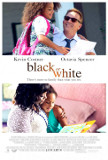Black or White (United States, 2014)
January 29, 2015
There could be no more timely subject matter for a movie in early 2015 than race relations in America. Black or White, a sporadically insightful movie from Mike Binder, approaches some of these issues head-on without flinching or resorting to hysteria. For the most part, it offers a balanced illustration of how stereotyping and subtle forms of racism can inform everyday actions and decisions. The film is by no means perfect and its goals are undermined by a sloppy climax and conclusion but it avoids preaching while providing fodder for thought.
This is the latest starring vehicle for Kevin Costner, who has returned to the limelight with a vengeance in the last few years after nearly two low-profile decades. Some of Costner's recent projects have obviously been financially motivated but that's not the case with Black or White, for which he receives a producer credit to go along with a starring role. In a previous review, I noted that Costner's acting has improved markedly with age. In his heyday - the years when he made the likes of The Untouchables and Robin Hood - his popularity was more about his looks than his ability. In Black or White, he displays more range than he ever did in the '80s and '90s. It's a difficult part because he has to make his character sympathetic while at the same time not hiding his demons: alcoholism and traces of ingrained racism that even he is unaware of. He is paired with fellow Oscar winner Octavia Spencer who, like Costner, is tasked with crafting a character who faces her own challenges about skin color.
Costner and Spencer play Elliot Anderson and Rowena Jeffers, the grandparents of a bi-racial 7-year old girl, Eloise Anderson (Jillian Estell). Eloise's family history is laced with tragedy. Her mother, Elliot's daughter, died at birth. Her father, Reggie Davis (Andre Holland), is a drug addict whose habit has dominated his recent years. She has been raised by Elliot and his wife, Carol (Jennifer Ehle), but when Carol is killed in a car accident, Rowena wonders whether a shared custody situation might represent an equitable approach going-forward. The struggle that develops isn't bitter -Elliot and Rowena, despite being oil and water, remain on speaking terms - but it highlights the differences in what the two potential caregivers believe to be best for their granddaughter. Both have their blind spots and weaknesses.
It's too bad that Binder goes for a feel-good ending because this poisons Black or White's final fifteen minutes with a forced, artificial feel that isn't helped by an ill-fitting dollop of magical realism. Individuals who are consistent over nearly 100 minutes of screen time suddenly act out of character. Binder's direction evidences heavy-handed moments - he relies overmuch on Terence Blanchard's heartstring-tugging score and he has a penchant for sentimentality (a problem in his previous outing, 2007's Reign Over Me). There are also some ill-advised attempts at comedy (Eloise's self-pimping tutor, the ditzy girlfriend of Elliot's lawyer) that come across as more awkward than amusing.
Black or White deserves credit for framing racism in less overt terms than we are used to seeing in motion pictures and more in-line with what "average" people encounter in real life. Movies in general gravitate toward hyperbole; Binder resists this. Elliot sees himself as color-blind; he's not aware that at least some element of his resistance to Rowena is based on stereotypes. Likewise, Rowena views Elliot through lenses tinted by her own prejudices. There's a telling scene in which Elliot enters Rowena's house and watches the free and easy way in which his granddaughter interacts with her cousins, aunt, and other members of the family.
Although young Jillian Estell gives an effervescent performance, she is underserved by a script that sees Eloise as a plot device. The girl has no real character - she's less a person than a catalyst. When she paints a picture, it's for us to see how Elliot and Rowena react to it. Her scenes with Reggie and Elliot are all about the adults. Eloise is supposed to be seven but she talks and acts like a much older girl and it's odd that her grief about her grandmother's death lasts for only a couple of scenes (while Elliot's is an ongoing companion). For a movie that wants us to believe that everyone involved seeks what's best for Eloise (rather than employing her as a pawn in a larger struggle), it's odd that the screenplay fails to make her more real.
For much of its running length, Black or White is an uncommonly brave film but it loses its gumption at the end. The good but flawed effort is at least partially undone by the way in which Binder chooses to conclude matters.
Black or White (United States, 2014)
Cast: Kevin Costner, Octavia Spencer, Jillian Estell, Bill Burr, Mpho Koaho, Anthony Mackie, Andre Holland
Home Release Date: 2015-05-12
Screenplay: Mike Binder
Cinematography: Russ T. Alsobrook
Music: Terence Blanchard
U.S. Distributor: Relativity Media
U.S. Release Date: 2015-01-30
MPAA Rating: "PG-13" (Profanity, Drugs, Violence)
Genre: DRAMA
Subtitles: none
Theatrical Aspect Ratio: 2.35:1
- (There are no more better movies of Jillian Estell)
- (There are no more worst movies of Jillian Estell)

Comments